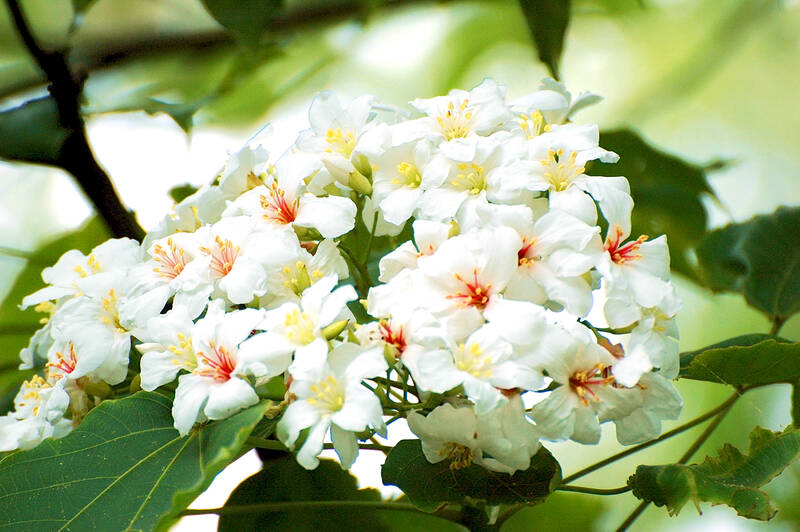對話 Dialogue
清清:時間過得好快,週末我開車經過三峽的時候看到山上的「白雪」,才發現已經進入五月了。
Qīngqing: Shíjiān guò de hǎo kuài, zhōumò wǒ kāichē jīngguò Sānxiá de shíhòu kàndào shānshàng de “báixuě”, cái fāxiàn yǐjīng jìnrù wǔyuè le.

Photo: Wikimedia commons 照片:Wikimedia commons 提供
華華:哇,聽起來就好美。不過,最近有寒流嗎?為什麼三峽會下雪呢?氣候又異常了嗎?
Huáhua: Wā, tīng qǐlái jiù hǎo měi, búguò zuìjìn yǒu hánliú ma? Wèishénme Sānxiá
wǔyuè huì yǒu xuě ne? Qìhòu yòu yìcháng le ma?
清清:我說的是「五月雪」油桐花啦!
Qīngqing: Wǒ shuō de shì “Wǔyuèxuě” yóutónghuā la!
華華:喔~原來是那個五月雪,我聽人家說五月的時候白色的花瓣飄落下來,好像下雪一樣,非常浪漫。
Huáhua: Ó~ yuánlái shì nàge Wǔyuèxuě, wǒ tīng rénjiā shuō wǔyuè de shíhòu báisè de huābàn piāoluò xiàlái, hǎoxiàng xiàxuě yíyàng, fēicháng làngmàn.
清清:是啊,而且這份浪漫不用頂著寒風,也不用出國,就能欣賞到。
Qīngqing: Shì a, érqiě zhè fèn làngmàn búyòng dǐngzhe hánfēng, yě búyòng chūguó, jiù néng xīnshǎng dào.
華華:不過滿山的花,風景這麼美,一個人欣賞太可惜了。
Huáhua: Búguò mǎn shān de huā, fēngjǐng zhème měi, yí ge rén xīnshǎng tài kěxí le.
清清:說的也是,要不然跟人事室建議一下,今年的員工旅行去賞桐花如何?
Qīngqing: Shuō de yěshì, yàoburán gēn rénshìshì jiànyì yíxià, jīnnián de yuángōng lǚxíng qù shǎng tónghuā rúhé?
華華:這個主意不錯,我來跟福委會提一下。期待能成行。
Huáhua: Zhège zhǔyì búcuò, wǒ lái gēn fúwěihuì tí yíxià. Qídài néng chéngxíng.
翻譯 Translation
Qingqing: Time flies. Over the weekend, when I drove past Sanxia and saw “snow” on the mountains, I realized it’s already May.
Huahua: Wow, that sounds beautiful. But... has there been a cold front recently? Why would it snow in Sanxia? Is the climate acting up again?
Qingqing: No, no, I meant “May snow” — that is, tung blossoms.
Huahua: Oh, that kind of “May snow.” I’ve heard that in May, the white petals fall like snow — so romantic.
Qingqing: Exactly. And the best part is, you don’t have to brave the cold or travel abroad to enjoy it.
Huahua: But with so many flowers blooming across the hills, it’s a shame to enjoy such beauty alone.
Qingqing: You’re right. How about we suggest to the HR office that this year’s staff trip be a tung blossom viewing?
Huahua: Great idea. I’ll bring it up with the staff welfare committee. Hopefully, it’ll happen.
生詞 Vocabulary
1. 油桐花 (yóutónghuā) Tung Blossom, a symbol of Hakka culture, is known for its white petals that fall like snow in May.
2. 寒流 (hánliú) cold front; cold wave
3. 氣候異常 (qìhòu yìcháng) abnormal climate; unusual weather patterns
4. 浪漫 (làngmàn) romantic
5. 欣賞 (xīnshǎng) to appreciate; to admire (e.g., scenery, art)
6. 人事室 (rénshì shì) human resources office; personnel office
7. 員工旅行 (yuángōng lǚxíng) staff trip
8. 福委會 (fúwěihuì) employee welfare committee
教材音檔 Audio Files
國立清華大學華語中心提供
By National Tsing Hua University Chinese Language Center:

A: Apart from the musical Sunset Boulevard, Japanese pop diva Ayumi Hamasaki is also touring Taiwan after a 17-year wait. She’s holding two concerts starting tonight. B: Ayu has the most No. 1 hits of any Japanese solo artist, with 33 total. A: “Time” magazine even crowned her as “The Empress of Pop.” B: She staged shows in Taipei back in 2007 and 2008, causing an “Ayu fever” across Taiwan. A: Unfortunately, the singer has been deaf in her left ear since 2008, and is gradually losing hearing in her right ear. I’m so excited to see her singing in Taipei again. A: 除了音樂劇《日落大道》,日本歌后濱崎步睽違17年,今晚起在台北熱唱兩場。

Alan Turing, celebrated as the “father of computer science,” was a brilliant mathematician and scientist. Born in London in 1912, Turing showed exceptional talent in mathematics and science from a young age. At 16, he understood Albert Einstein’s work without difficulty. This intelligence carried him through studies at Cambridge University and later at Princeton University in the US, where he further explored complex mathematical theories. In 1936, Turing introduced the concept of the Turing machine, a theoretical device for solving mathematical problems. He described it as having an infinite tape on which symbols could be read, interpreted, and modified. With simple

Denmark’s state-run postal service, PostNord, announced that it would cease letter deliveries at the end of 2025 due to the impact of digitalization. As 95% of its residents now use the Digital Post service, Denmark has seen a 90% decline in letter volumes since 2000, from 1.4 billion to 110 million last year. On top of that, the Postal Act of 2024 removes the government’s obligation to provide universal mail service and puts an end to postal exemptions from value-added tax, raising the cost of a single letter to 29 Danish krone (US$4.20). As a result, PostNord is switching

A: After touring Taipei, the play Life of Pi is now heading to Taichung. You wanna go? B: Did you forget? We’re going to Taipei this weekend to see the musical Sunset Boulevard and go to Japanese pop diva Ayumi Hamasaki’s concert. A: Oh yeah, that’s right. The classic composed by Andrew Lloyd Webber is touring Taiwan for the first time. B: I heard that it’s adapted from a 1950 film with the same title. A: And the show will feature legendary soprano Sarah Brightman, who is finally returning to the musical stage after 30 years. We can’t miss it. A: 在台北巡演後,戲劇《少年Pi的奇幻漂流》本週起將移師台中。要去嗎?